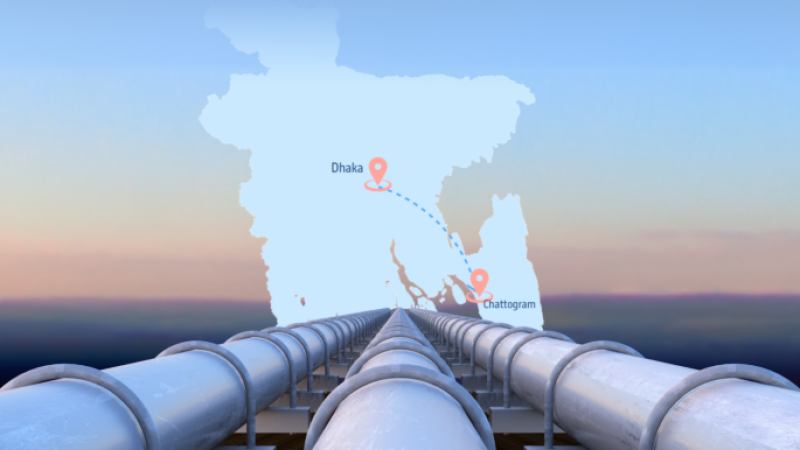- Project to transform N’ganj into a climate-resilient green city |
- Sustainable, rights-based solutions to Rohingya crisis urged |
- Inqilab Monch Seeks Home Adviser’s Exit |
- UN Calls for Calm in Bangladesh After Protest Leader’s Killing |
- DMP issues 7 traffic directives for Osman Hadi’s Janaza |
Ctg-Dhaka 250km Fuel Pipeline to Slash Transport Costs

Bangladesh is set to launch its first direct fuel pipeline from Chattogram to Dhaka tomorrow (16 August), a major milestone in the country’s energy logistics. The project is expected to cut transport time from 48 hours to just 12 and save the state around Tk226 crore annually.
The Tk3,653 crore initiative, led by the Bangladesh Petroleum Corporation (BPC) with the Bangladesh Army's 24 Engineering Construction Brigade, will be inaugurated by Energy Adviser Fouzul Kabir Khan at the Padma Oil terminal in Guptakhal, Chattogram.
For decades, fuel for Dhaka and central Bangladesh was transported by tanker ships from Chattogram to Narayanganj and other points—a slow and costly process prone to weather disruptions, accidents, and theft. The new 250km underground pipeline will reduce annual costs from Tk326 crore to about Tk90 crore and significantly lower system losses and fuel theft.
The project, approved in October 2018 at an initial cost of Tk2,861 crore, faced delays due to the COVID-19 pandemic, pushing completion to March 2025, with final costs rising by roughly Tk800 crore. The infrastructure includes a 241.28km, 16-inch mainline from Chattogram to Godnail in Narayanganj and an 8.29km, 10-inch branch to Fatullah, crossing 22 rivers and canals with nine pumping stations along the route. A total of 286.88 acres of land was acquired for the project.
To support operations, a fully automated depot has been established in Mogbari, Cumilla’s Barura upazila, and new storage tanks have been installed in Narayanganj for Padma, Meghna, and Jamuna Oil companies.
Project director Md Aminul Haque confirmed that trial runs in February successfully transported 50 million litres of diesel without losses. “The pipeline, depots, and reservoirs are all ready. Minor technical issues were resolved during testing,” he said.
The pipeline has a carrying capacity of 350 tonnes per hour, moving 2.7–3 million tonnes annually, with potential expansion to 5 million tonnes. A control room in Patenga will enable real-time monitoring of fuel flow and security.
BPC officials view the pipeline as a strategic upgrade for Bangladesh’s energy sector, ensuring steady supply to Dhaka and surrounding districts while reducing dependence on river transport.

